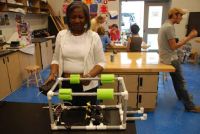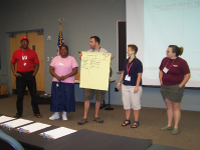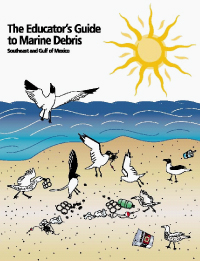Coastal and ocean sciences in the southeastern United States address research leading to knowledge, advanced technologies, and societal applications. Current examples of priority applied themes include: influence of extreme weather, high energy waves and currents on fragile and dynamic barrier islands; impacts of rising sea level and increasing tidal range on the health of tidal creeks and salt marsh ecosystems; and emerging understanding of the value of offshore shelf and slope resources, such as deep corals and Gulf Stream-related habitats.
COSEE SE, utilizing its Board of Advisors, selects relevant research themes for use as a springboard in designing efforts to provide interactions for scientists and educators in North Carolina, South Carolina and Georgia. Regardless of the topic, COSEE SE under the direction of Dr. Lundie Spence, challenges the status quo of science education, consistently fostering relationships between the scientific and educational communities; exploring and utilizing new technologies and scientific information; encouraging underrepresented groups to pursue ocean science careers; and developing partnerships on a regional and national scale.
 | |
|
Supported activities that foster these relationships include: professional development opportunities; mass media events, products and publications; survey development and execution; and participation in national and regional conferences. The COSEE SE team stays busy, energized with knowing that there are always new, exciting projects to pursue that are driven by discovery and technology advancements!
Over the last year there have been some changes in the COSEE SE team and Board of Advisors. Elizabeth Joyner, the former COSEE SE marine education specialist for South Carolina, accepted a position as Memminger Elementary School’s science coach in Charleston, South Carolina. Elizabeth Vernon Bell, formerly with the South Carolina Department of Natural Resources, now serves as South Carolina’s marine education specialist for COSEE SE. Margaret Olsen from Georgia retired with accolades and continues to lead key projects. Angela Bliss moved from the University of Georgia (UGA) Marine Extension Service (MAREX) Shellfish Lab to serve as Georgia’s COSEE SE liaison. In January, we lost Steve Fisher, our evaluator from the University of South Carolina (USC), who passed away unexpectedly. In his stead, Ching Ching Yap, also from USC, has stepped in to assume the evaluation responsibilities.
| |  |
|
Programmatically, we have tightened our vision and refined our professional development events to address STEM (science, technology, engineering and mathematics) disciplines. These events include: the seven-day Ocean Sciences Education Leadership Institute (Institute), which addressed undersea research and technology through building Remotely Operated Vehicles (ROVs); learning about shelf and slope resources through NOAA Undersea Research Center for the Southeast Region, NOAA Ocean Explorations, and regional studies; two-day ROV MATE workshop partnering with Cathy Sakas of NOAA Gray’s Reef National Marine Sanctuary; seven-day Taking the Pulse of Our Coastal Ocean workshop on ocean observation information coordinated by Quint White at Jacksonville University; eight 1-day Ocean Awareness Days at informal facilities focusing on the summer’s Institute theme; and the two-day January workshop for scientists to refine the construction of the Basic Observation Buoy (BOB) with Doug Levin of the NOAA Chesapeake Bay Office. Information on many of these programs is available on our website.
COSEE SE also addressed STS (science, technology and society) through the Coastal Legacy seven-day workshop that focused on the impacts of coastal development on the health of tidal creeks and estuaries. In addition, our Board of Advisors suggested that diversity efforts could be more successful if we were able to develop a program for elementary teachers as an early introduction to the ocean. Thus, Margaret Olsen, along with many other educators, generated the one-day workshop, Our Amazing Coast, which is modified for Georgia, South Carolina and North Carolina teachers.
 | |
|
Building on a 2007 Charleston Post and Courier newspaper series, Turning the Tide on Trash, COSEE SE developed and published a middle school, 48-page publication, The Educator’s Guide to Marine Debris for the Southeast and Gulf of Mexico. This publication provides an accessible avenue of ocean science stewardship based on science and volunteer information. The guide was developed in partnership with: South Carolina Sea Grant, South Carolina Department of Natural Resources, South Carolina Department of Health and Environmental Control-Office of Coastal Resource Management, North Carolina Sea Grant, North Carolina Big Sweep, UGA MAREX, Georgia Department of Natural Resource, Florida Sea Grant and Mississippi Sea Grant, through COSEE-Central Gulf of Mexico.
COSEE SE is developing new strategies to support regional ocean scientists. A report of responses from over 100 scientists should be available by March. We are supporting the National COSEE Diversity Working Group, which includes Dr. Dionne Hoskins from Savannah State University and current co-Chair for the COSEE SE Advisory Board. Visit the Broadening Participation in the Ocean Sciences page on our website. We continue to enjoy collaborative exchanges with COSEE Great Lakes and other COSEEs. Over the past five years, COSEE SE has explored and implemented a number of new activities, through assessment and input from our Board of Advisors and internal discussion. We shall identify the existing programs that align with National Science Foundation needs and develop a vision of what COSEE SE should “look like” in the next five years.
COSEE SE derives its strength, momentum and creativity through the depth of its local, regional and national partnerships. It is through these partnerships that COSEE SE retains the ability to offer high quality and relevant ocean sciences educational opportunities throughout the southeast, and offer valuable education and outreach services to the ocean sciences community.
Visit COSEE SouthEast!

